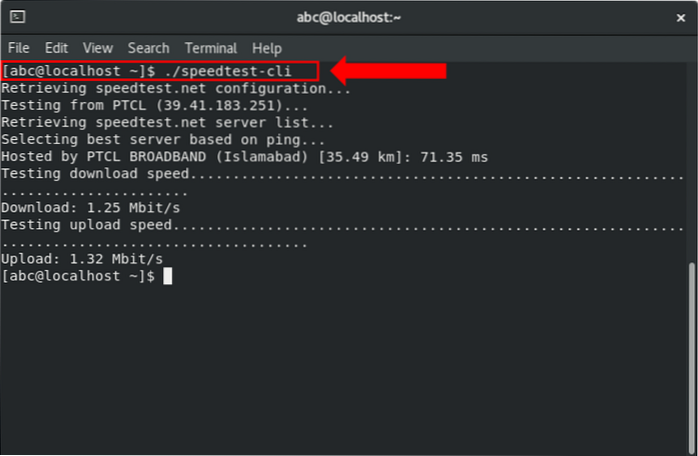In this article, we will explain how to set timers, alarms, and stopwatches on your Ubuntu system.
...
Use the Timer
- Set custom time for the timer.
- Start the timer through the Start button.
- Pause a running timer through the Pause button.
- Resume a paused timer through the Continue button.
- Reset the timer through the Reset button.
- Is there a timer in Ubuntu?
- How do I set an alarm on Linux?
- How do I keep my laptop alarm on Ubuntu?
- What's the difference between an alarm and a timer?
- How do you set a timer in Unix?
- Does Linux have a timer?
- How do I show the clock on my desktop Ubuntu?
- How do I change the alarm sound on my gnome?
- How do you implement a timer?
- How does timer work Linux?
- What is a Posix timer?
- How accurate is Linux time?
- How do I display time in Linux?
- What is a kernel timer?
Is there a timer in Ubuntu?
It is also easily installable from your Ubuntu software center. You find it by typing stopwatch in the search window. Or if you prefer, you can also find it in the synaptic package manager.
How do I set an alarm on Linux?
To set an alarm on the terminal, we can use the sleep command which is defined by a time value followed by a notification. So, define the sleep command by typing “sleep” and then a numerical and qualitative value like for example 5h (for five hours), or 7h 30m (for seven and a half hours).
How do I keep my laptop alarm on Ubuntu?
Set Alarm Clock as Ubuntu Startup
- Open Ubuntu menu > type startup > open Startup Applications.
- Make sure there is an entry for Alarm Clock. If yes, close the window.
- If there is no entry, add new entry for Alarm Clock. Click Add button > type alarm-clock-applet in the Command text box. You can name it anything then.
What's the difference between an alarm and a timer?
To use an alarm, you set a specific point in time as a trigger. To use a timer, you choose a duration of time from any starting point and count until the duration has expired to set off a trigger. An alarm triggers at a certain time in the future; a timer counts down from a starting time for a specified duration.
How do you set a timer in Unix?
- getitimer() - Unix, Linux System Call. Advertisements.
- NAME. getitimer, setitimer - get or set value of an interval timer.
- SYNOPSIS. #include <sys/time.h> ...
- DESCRIPTION. The system provides each process with three interval timers, each decrementing in a distinct time domain. ...
- RETURN VALUE. ...
- ERRORS. ...
- NOTES. ...
- CONFORMING TO.
Does Linux have a timer?
The Linux kernel provides a software timer concept to allow to kernel functions could be invoked at future moment. Timers are widely used in the Linux kernel.
How do I show the clock on my desktop Ubuntu?
Step 2) Enter the following command and press enter to install dconf-editor. Step 3) Go to “Activities” and launch “dconf-editor”. Step 4) Carefully navigate to org/gnome/desktop/interface. Turn on the “clock-show-date” and “clock-show-seconds”.
How do I change the alarm sound on my gnome?
Create a custom sound profile
Open the index. theme file and change the name to my-custom-profile. Replace the sounds you want to change with your own, but be careful, a long sound for audio-volume-change for example will play on volume change until it is completed.
How do you implement a timer?
I set the Enabled property to false on the Stop button click event handler, that stops executing the timer tick event. Now the last step is to write the timer's tick event to write the current time to the text file. Write the following code in your timer event, private void timer1_Tick(object sender, System.
How does timer work Linux?
Timers are used to schedule execution of a function (a timer handler) at a particular time in the future. They thus work differently from task queues and tasklets in that you can specify when in the future your function will be called, whereas you can't tell exactly when a queued task will be executed.
What is a Posix timer?
POSIX timers allows a mechanism that can notify a thread when the time as measured by a particular clock has reached or passed a specified value, or when a specified amount of time has passed. Facilities supported by POSIX timers that are desirable for real-time operating systems: Support for additional clocks.
How accurate is Linux time?
If this exact clock is inside your LAN (local area network), the accuracy of your Linux machine clock is within 0.01 sec. If you use the internet for this purpose, the accuracy of your clock will be within 0.2 sec regarding to the exact time.
How do I display time in Linux?
To display date and time under Linux operating system using command prompt use the date command. It can also display the current time / date in the given FORMAT. We can set the system date and time as root user too.
What is a kernel timer?
A kernel timer is a data structure that instructs the kernel to execute a user-defined function with a user-defined argument at a user-defined time.
 Linuxteaching
Linuxteaching



